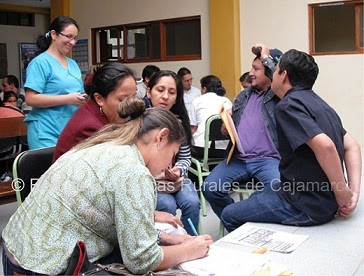The team of volunteer coordinators
of the Campesina Encyclopedia Project celebrated the successful completion of
our encounter. On 28th and 29th of April, after traveling for many
hours to get to the center in Cajamarca - from Jaen and Cutervo, San Marcos and
Cajabamba, Chota and Bambamarca, Celendin and Cajamarca, we gathered to affirm
the coordination of the rescate
(sharing and recording) and the affirmation of our ancestral wisdom.
We started with the essential
task of an honest self-evaluation of our wanderings, what works and what needs
to be improved. We worked on techniques that could be used to improve our
approach so that the rescate could
flow more freely. We emphasized the basic tasks of a project coordinator,
ensuring that all are aware of the implications of this commitment, and we
shared the materials needed to support this process.
Then came the magic: the rescate. This year we focus on three
main themes: cajamarquina vocabulary speech, agricultural calendar and the
"secrets" (cultural formulas caution and solution).
The glossary is a rich
collection of words full of history and culture, with its roots in Quechua or
pre-Columbian languages of our region, enriched by centuries of use by our elders.
The agricultural calendar is a
complex issue and much time was devoted to a discussion on the necessary method
of rescate. We resisted falling into
the trap of following the structure of the Gregorian calendar, trying to
squeeze the various elements governing the art of agriculture into this imposed
structure. On the contrary, those who know best - the agriculturalists, assessed
by experience what elements come first. We talked about the altitude, the soil,
the season and the type of seed; the phases of the moon, the rain and dates ...
The coordinators hope to replicate this open form of rescate in their own communities.
The rescate of "secrets" took on
the magic of what was being spoken of. Offering their knowledge, each
participant contributed to the creation of an enchanting atmosphere. The room
was full of wonder at the depth and richness of the wisdom that has been passed
down from generation to generation and which still thrives.
During the gathering Alfredo
Mires, Advisor to the Network and Project Director, also shared with the
coordinators the progress that has been made with the upcoming book on sayings.
Many of those present had contributed to the rescate of knowledge that fills the pages of this book. We were
pleased to see the progress and give our opinions.
Vital discussions emerged from
the working groups. The results will enrich the final result.
And there was even time to
play ...

































